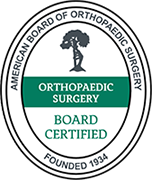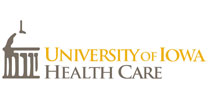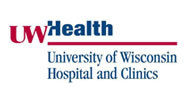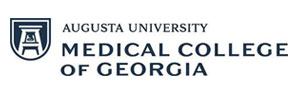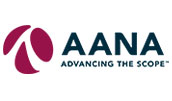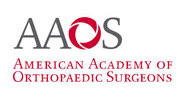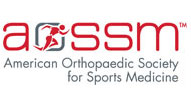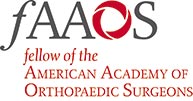Knee Post-operative Instructions
Wound Care and Follow-up
Maintain your surgical dressing, loosen bandage if swelling of the foot occurs. It is normal for the knee to bleed and swell following surgery. If blood soaks through the bandage, do not become alarmed, reinforce with additional dressing. If your surgery involves arthroscopy, you will follow-up with Dr. Akoh on postoperative day 3 to change the surgical dressings and to go over arthroscopic images. If your surgery does not involve arthroscopy, then you will follow-up in 10-14 days for a wound check. If you are unable to come to your first follow-up appointment, then you can have your physical therapist remove the dressings only (not sutures) and cover the portal sites with bandages.
If minimal drainage is present, apply band-aids or a clean dressing over incisions and change daily. To avoid infection, keep surgical incisions clean and dry and do not wet your surgical extremity for the first two weeks until sutures are removed in clinic.
Bruising after Surgery
You may have some bruising after surgery. This is normal and will vary from person to person the extent of bruising. Some people may only have a small amount of redness around the surgical area. Others may have bruising down the entire leg and into the foot. Both are normal and will resolve over 10-14 days.
Swelling after Surgery
It is not uncommon to experience swelling after surgery. Sometimes, you will not swell till several days after your surgery. Remember that your body is healing from surgery and some swelling is normal. The more activities and physical therapy you do the more swelling you will have. With that said, we do want you to remain active and begin physical therapy. Icing, elevating the leg, and performing your ankle pumps will help decrease the amount of swelling.
You should be alarmed if you have swelling for several days that is accompanied by redness, heat or coolness in your surgical leg, or if the swelling does not resolve with ice and exercise. If this is the case please contact Dr. Akoh’s office.
Wound Care
Brace
Your brace should be worn fully extended (straight) at night and for walking, except for exercises until otherwise informed by the physician after first post-operative office visit. Your physical therapist will adjust the brace as needed throughout the rehabilitation process. Please contact the clinic if you have questions in regards to your brace wear.
Ice Therapy
Begin immediately after surgery. Use your icing machine continuously (if given one) or ice packs (if machine not prescribed) every 2 hours for 20 minutes daily until your first post-operative visit – Care should be taken with icing to avoid frostbite to the skin.
CPM (Continuous Passive Motion Machine)
More instructions in regards to this device will be given to you, if you are prescribed one.
Sleeping
Do not place pillows under knees (i.e. do not maintain knee in a flexed or bent position), but rather place pillows under foot/ankle. Make sure your pain is well controlled throughout the day. Try to avoid taking too many naps, although your medications may make you tired. Try to keep a “normal” schedule. If you are truly having issues sleeping you make talk to a pharmacist about an over the counter sleep aid.
Showering/Bathing
You can shower 72 hours (3 days) after your surgery, we ask that you keep the incision clean, dry, and covered. When you shower you can buy bandages that seal the wound and are waterproof. Ask your local pharmacy or drug store if they have these types of dressings. You may also place your leg in a trash bag or shower bag (may find at local pharmacy/drug store) and seal the top so no water can get inside. After your sutures are removed you can shower without any type of dressing or bag. We ask that you refrain from soaking or sitting in any type of tub until at least 6-10 weeks after your surgery.
Hot Tubs/Whirlpools
Because of the heat and bacteria in the water we DO NOT want you to use a hot tub or whirlpool for the first 6 weeks after surgery.
Suture removal
Your sutures will be removed 10-14 days after surgery. If you are going to physical therapy at Rush Copley, the physical therapist may remove your sutures. If you would like to have them out in the office you can make an appointment with us to do so.
Activity Level
Every patient is different. Every day you should start to increase your activity level, but let your pain and swelling level be your guide. Keep in mind that at some point you may “overdo it,” lots of people make this mistake. You may feel you have taken two steps backward in physical therapy. This is normal and it does happen. Speak with your physical therapist about adjusting your rehabilitation program. If your pain or swelling becomes out of control contact Dr. Akoh’s office.
Driving After Surgery
The ability for someone to resume driving after surgery is seldom a medical question, but usually a legal question. It is always the responsibility of all licensed drivers to drive safely, no matter what their permanent or temporary impairment may be. Your reaction time following surgery may be compromised, secondary to medication and/or pain. The ability to fully use all extremities may be impaired after surgery, especially if surgery involved your right foot/ankle.
When can I start my normal/daily medication again?
Consult with you primary care doctor or internist on when you should start these again. Most of them you should be able to begin the day after surgery, but please check with them before starting anything.
Medications
Narcotics
Most patients will require some narcotic pain medication for a short period of time. We normally prescribe Norco (AKA hydrocodone with Tylenol/Vicodin). In some cases we may prescribe something stronger called Oxycodone if we feel this is necessary. When you are no longer experiencing moderate pain, you may stop taking the narcotic medications. You can call our office and ask for a less strong narcotic, or switch to over the counter medications for discomfort. You will also be given an anti-emetic; this is something that will help with any nausea from the narcotic.
Narcotics do have side effects, common ones are
- Nausea
- Drowsiness
- Constipation
We recommend that you take all of your medications with food, to help with the side effects. We may prescribe you something ahead of time if you know you react badly to certain drugs. If you have issues with the medications please call Dr. Akoh’s office and someone can assist you. Because some medications may make you sleepy/drowsy DO NOT drive while taking them.
Constipation with Narcotics
We recommend that you drink plenty of fluids and eat lots of fruit and high fiber foods to help avoid any constipation issues from the medications. If you do become constipated try taking over the counter Miralax or Colace. These are mild oral laxatives. You can also try magnesium citrate, this is a stronger laxitive. To try and prevent constipation you can take over the counter stool softeners while you are taking narcotic medication. You can always talk to your local pharmacist for recommendations of over the counter medications to help with constipation.
If you are still unable to have a bowel movement after trying the above remedies, contact Dr. Akoh’s office, for further guidance.
When do I NEED to call the doctor immediately?
If you have…
- Fever over 101.5 F
- Chills
- Sweats
- Excessive bleeding (you had to change the dressing twice in 12hrs)
- Foul odor from wound
- Excessive redness
- Excruciating pain
- Yellow/green discharge
During regular business hours call Starlyn Nadeau the Nurse
- Phone , option 3, then option 1
Evenings, nights, and weekends
- Call . Follow the prompts to the emergency line and ask for the Orthopaedic On Call
- Go to the Emergency Room
Please DO NOT call the on-call Orthopaedic Staff in-regards to pain medication requests or refills. Contact Dr. Akoh’s office or Starlyn Nadeauduring normal business hours for this.
- If you think that you will run out of your prescribed medication over the weekend, please call our office by Wednesday so that we have sufficient time to respond to your refill medication request

